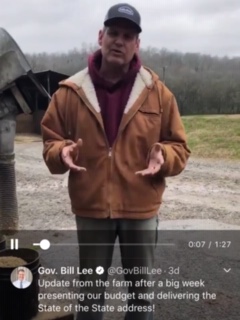In the wake of COVID-19 wreaking havoc with school schedules, cancelling football games, and closing down at least one Williamson County School (Fairview Middle), the Williamson County School Board has called a special meeting for tonight to ask Gov. Bill Lee (a Williamson County resident) to include school operations in his emergency order so that remote instruction can be an option for virus mitigation.
Here’s a tweet from Williamson Strong with the resolution:
Here are some video messages from advocates of mitigation strategies that include a mask mandate:
Dr. Meredith Duke, a Vanderbilt Surgeon and mother of children in Williamson County Schools pleaded, “I attended the last board meeting almost two weeks ago and I was appalled at the behavior of the crowd and the lack of decorum… One of the mask mandate supporters was an infectious disease expert from Vanderbilt. I repeat, you had an infectious disease expert here, encouraging a mask mandate. She pleaded for our children’s safety and she adamantly supported a universal mask mandate.
“We were not heard and that has brought us to today. COVID is spreading in a completely uncontrolled fashion. Our children are sick, our teachers are sick, and our families are sick. In two weeks, both of my sons have had COVID exposures. I’m already canceling necessary surgeries because we don’t have beds to care for our patients. We don’t have beds, where our hospitals are literally at a breaking point. We, our community, needs to do something to make this stop. It’s imperative that you pass and enforce a universal mask mandate for all of our schools. We need to improve contact tracing quarantine protocols. We don’t have an adequate vaccine update. We are not mitigating anything. Your job is to provide a safe environment for children to learn. They are not safe. Please do your job. Stand up to the anti mask bullies and listen to the experts.”
Watch Dr. Duke’s full video statement here
Todd Barton, a arent of two children in Williamson County Schools called on the school board to follow CDC and American Academy of Pediatric guidelines, “The CDC, along with the American Academy of Pediatrics, thousands of local doctors and pediatricians, and our area hospitals, including Williamson County Medical Center have been very clear. And what they are recommending for schools during this pandemic masks, contact tracing, distancing limits to gatherings and quarantines. And all we’ve seen so far is a very limited mask requirement in elementary schools. And what we’re also seeing is the very predictable result of that. At my daughter’s school, nearly half the students are out, along with about a third of teachers and staff as well as a number of bus drivers. Students are in classrooms with substitutes, or sometimes staff who have no educational training. And when school closes, because, inexplicably, we’re prevented from using remote learning, they receive no instruction whatsoever at home. I don’t understand this. I know that there are some very loud voices involved. I know that there’s politics involved. But I’m begging you to rise above that, and to see to the health and safety of the students, teachers and staff staff by following the recommendations given to you by the medical professionals, as well as instituting a remote learning platform that was proven very successful last year to ensure continuity of learning.”
Watch Todd’s full video statement here
Kristie Harris, a Registered Nurse, small business owner, and mom of children who contracted COVID-19 from their Williamson County school shared that she has been so careful to not expose herself or her four children to COVID in the past year and a half. As a single mother who has asthma, she waited until she was vaccinated to put her children back in in-person school, because more than anything, she didn’t want to leave them as orphans. She shared that, “the current opt out system is what put my kids at risk. We were safe until we returned to school, and just 11 days to the year they are COVID positive. What’s even crazier is according to the Williamson County’s current exposure and quarantine rules, I could send my 13 year old to school right now, I could send him to school, not only could I send him, but I could send him unmasked to school because he doesn’t have any symptoms. And even though his brothers are both sick and COVID positive, there’s no rule against sending your kids to school with other kids at home who are positive. It’s absolutely insane. Of course, as a responsible parent and member of our community, I would never do that. But it does beg the question, how many are? The current exposure and quarantine policy is absolutely absurd. It’s dangerous, and it’s what’s continuing this path that we are on.” She ended saying, “I’m urging you to protect our kids.”
Watch Kristie’s Statement here

For more on education politics and policy in Tennessee, follow @TNEdReport





